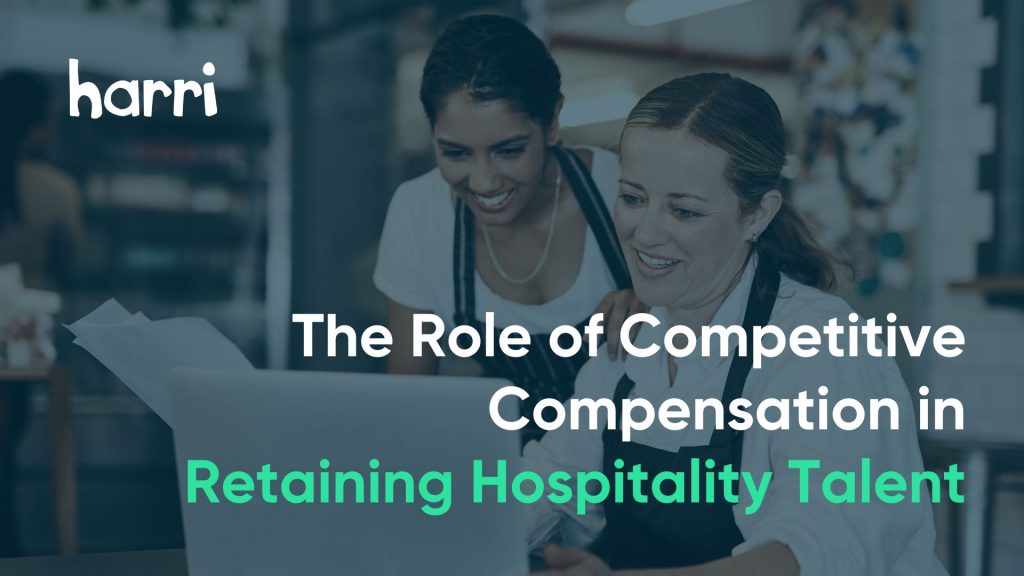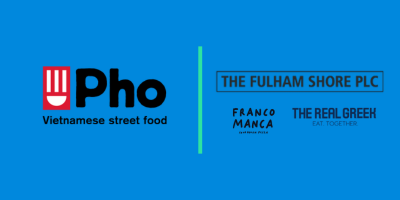The Role of Competitive Compensation in Retaining Hospitality Talent

- By Harri Insider Team | May 28, 2024
The Impact of Fair Hospitality Compensation
Let’s face it: people work for money. Even those of us who love our jobs would be unlikely to do them for free. Compensation has a huge impact on most people, no matter the industry – and hospitality compensation is certainly no exception. When employees feel fairly compensated for their work, they are more likely to stay with the company. Keep reading to learn more about employee retention in the hotel industry – and how you can lower your overall costs by keeping your top talent.
Hospitality Compensation and Employee Retention in the Hotel Industry
Everyone wants to feel appreciated and valued – and when they don’t, they start looking for a new employer who knows their worth. That’s why hospitality compensation should be a key area of focus for any hospitality business leaders. These areas in particular are affected:
- Attracting top talent – Competitive compensation packages are more likely to intrigue a larger pool of applicants, which means your chances of finding the best and brightest are increased.
- Motivation and job satisfaction – Adequate hospitality compensation can make employees inherently more motivated to do a great job, which leads to better performance and overall job satisfaction.
- Financial stability – Fair hospitality compensation provides your employees with financial security, which means they are less likely to seek opportunities elsewhere. By rewarding your staff with higher pay, they won’t have the need or desire to look for other employment based on money alone. Also, financial stability can overall improve employees’ health and wellbeing, meaning they can bring their best self to work without stress or worries about their financial situation.
- Retaining experienced employees – Keeping your more senior employees is crucial for your organization’s success. Their knowledge and skills are essential to getting new staff up to speed and reducing costly turnover. Losing highly skilled employees leaves a serious gap in experienced coverage which takes a lot of time and effort to fill.

Five Key Trends in Hospitality Compensation
It’s important to be in the know regarding what today’s most qualified candidates are looking for. Remember: they have a lot of options, and they will be considering a few different factors. Here are the trends making an impact now:
- Competitive Base Salaries: Many hospitality companies are offering higher base salaries to attract and retain talented employees. While it’s always difficult to raise the costs associated with doing business, business leaders can learn about the ROI of increasing salaries and how they affect retention by digging into metrics like time to hire or cost to hire. Leverage Harri’s technology to dig into these metrics as well as others that can help you manage overall labor costs. Access real-time data and built-in analytics created specifically for the hospitality industry, so that you can make the smartest decisions about your compensation packages.
- Acknowledging and Reducing High Turnover: For many years, employee retention in the hospitality industry was an afterthought. Turnover was high, but managers thought that was an unfortunate part of this unique industry. Now, however, many organizations can see the long-term value in retaining their best employees.
Harri helps companies to address turnover triggers in several ways. Scheduling is often a pain point for hospitality workers, and Harri offers intelligent scheduling software designed to simplify shift management and provide real-time scheduling insight for managers and employees. Use Harri to configure shifts and set rules, developing optimal shift schedules that take into account customer demand, employee availability, labor laws, and even weather. Additionally, Harri helps to foster a positive culture with tools designed to enhance engagement, such as extra support for new hires, targeted communications, and streamlined communication with your entire staff. The single integrated solution offers a place where employees can provide feedback, view schedules, and even change shifts, so that they are always connected and in the know.
- Employer Branding: People give more thought to their employer than they used to. Good pay is important, but job seekers also want to understand why they should work for you. Fortunately, Harri offers robust career branding solutions that drive excitement about your organization and create a competitive advantage in a crowded market. Use the tools to host information on open roles, organizational values, culture, benefits, and even employee testimonials.
- Flexible Work Arrangements: The hospitality industry is adapting to the changing work preferences of employees, and that’s a good thing. Many hospitality workers cite rigid schedules as a reason for leaving their job. Because of that, more companies are offering flexible work arrangements such as part-time schedules or flexible hours. Harri’s comprehensive workforce management solution prioritizes flexibility and engagement. The platform enables operators to create more adaptable scheduling, which aligns with employees’ availability and preferences, helping to alleviate stress and reduce burnout. Employees can even use the app to swap shifts while adhering to the shift rules you have in place.
- Location-Based Compensation: Compensation in the hospitality industry can vary based on geography. For example, cities with a higher cost of living are likely to offer higher salaries compared to rural areas. Our integrated talent acquisition tools enable you to easily reach, recruit, and engage active and passive candidates wherever you are. You can also tag applicants and existing employees to develop a marketable talent pool of candidates for open positions across alternative locations or brands, so that you can meet the specific needs of all of your locations.

Learn More About Hospitality Compensation Benchmarks
Employees are more aware of compensation policies, so being fair and transparent when it comes to pay is crucial. Pairing competitive pay policies with a positive and inclusive work environment is a winning combination that will help you to keep your most valued assets – great staff.
If you aren’t sure how your compensation packages stack up, it’s worth doing some research. The US Bureau of Labor and Statistics shares that non-supervisory workers in the hospitality industry earn approximately $18.21 per hour as of January 2023. Some websites estimate a higher wage of about $24/hour, while the average salary for hospitality workers in the UK is £25,000, which works out at roughly £12.03 per hour – keeping in mind the minimum wage for ages 21 and above is £11.44 in the UK.
Of course, position and seniority impact every employee’s individual salary. According to data from Zippia, an entry-level hotel desk clerk starts at around $11 in smaller markets but can
make as much as $14.74 an hour or more in big cities, while a concierge begins at around $12.50 and can make up to $16.19 an hour.
Additionally, yearly salaries for supervisory roles can vary widely:
- For hotels under 150 rooms, a General Manager can expect to make between $59,000 and $78,000, while a hospitality manager in the UK should make an average of £31,190.
- This number rises to $95,000 for establishments with up to 250 rooms and $145,000 for rooms up to 350 rooms. Hotels with 450 rooms or more have a typical General Manager salary of about $174,000.
- Catering Directors, Course Managers, Membership or Marketing Directors can all expect a salary between $60,000 and $80,000.
- In the UK, common hospitality roles such as an Operations Manager can be looking at £43,068, while a Catering Manager fetches up to £28,867.
- It’s worth noting that in the UK, hospitality salaries are rising at a strong clip. Hospitality workers in the UK received an average pay raise of 9.5%, vs. the national average of 6.6%.
Adapting for Better Employee Retention in Hospitality
Employee retention in the hotel or food service industry hinges on the ability to adapt to the changing dynamics of the workforce. Savvy employers will embrace these changes and leverage platforms like Harri to attract, hire, and retain top talent who can help to grow their business. Competitive hospitality compensation is key to this strategy, ensuring that employees feel valued and are less likely to seek opportunities elsewhere.
Ready to boost employee retention and reduce turnover in your hospitality business? Start implementing competitive compensation strategies today. Leverage Harri’s innovative platform to attract, hire, and retain top talent. Don’t let high turnover rates hold your business back – take action now and secure your future success.
Contact Harri to learn more about how our solutions can help you build a stronger, more dedicated workforce.





















